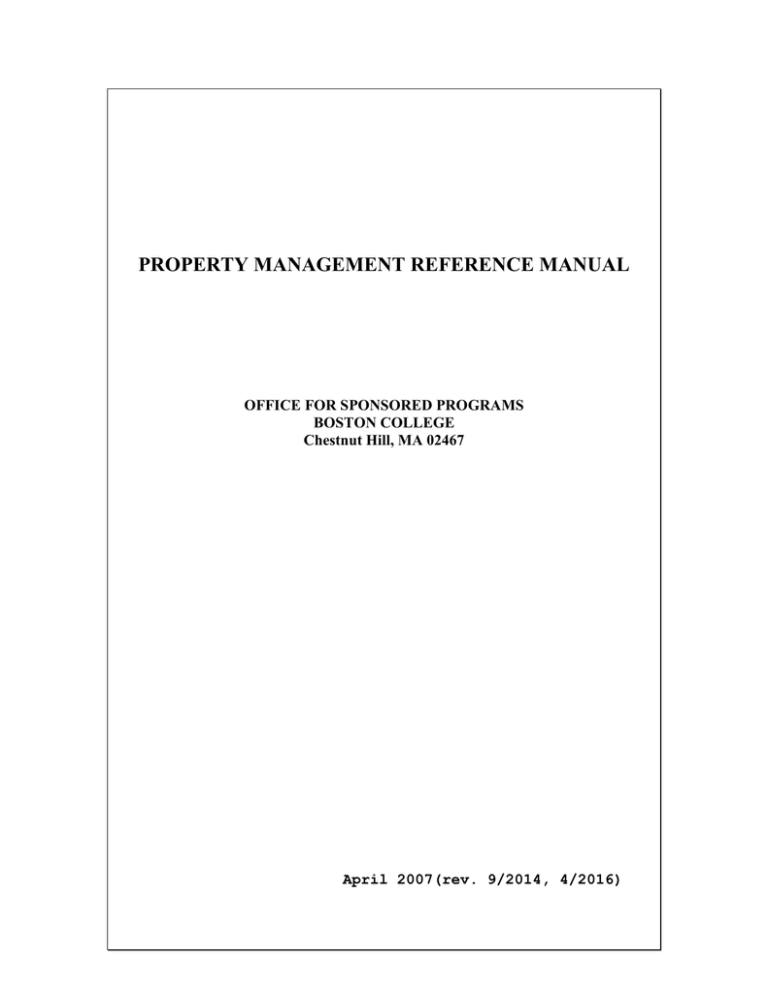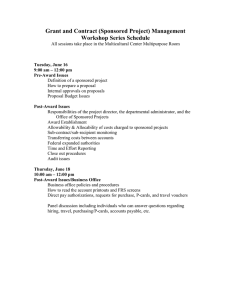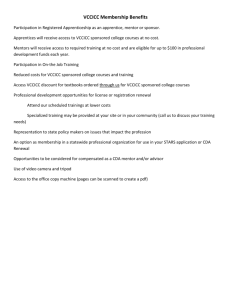PROPERTY MANAGEMENT REFERENCE MANUAL OFFICE FOR SPONSORED PROGRAMS BOSTON COLLEGE
advertisement

PROPERTY MANAGEMENT REFERENCE MANUAL OFFICE FOR SPONSORED PROGRAMS BOSTON COLLEGE Chestnut Hill, MA 02467 April 2007(rev. 9/2014, 4/2016) Table of Contents Page FOREWORD 1 A. Definitions 2 B. Responsibility 3 C. Property Administration 4 D. Maintenance 7 E. Subcontracts 8 F. Reports 8 G. Self-Assessment 9 FOREWORD This manual sets forth procedures for maintaining control of all Government property in the possession of Boston College. These procedures are in accordance with the Federal Acquisition Regulations, Part 45, and are applicable to all Government contracts awarded to Boston College. These procedures are consistent with Boston College Policies and Procedures related to the control of Government property. In addition, Boston College also takes into consideration the special terms and conditions of awards and applicable sections of the following federal government regulations: -OMB 2 CFR 200 sections 200.310-200.316 Property Standards effective 12/26/2014. And previously with: -Office of Management and budget (OMB) Circular A-21, Cost Principles for Educational Institutions, specifically sections J.14 and J.18 http://www.whitehouse.gov/omb/circulars/a021/a21_2004.html -OMB Circular A-110, Grants and Agreements with Institutions of Higher Education, specifically sections 33 and 34 http://www.whitehouse.gov/omb/circulars/a110/a110.html 1 A. DEFINITIONS 1. EQUIPMENT means property with an expected service life of two years or more and a unit or system acquisition cost of $5000 or more. 2. GOVERNMENT PROPERTY means all property owned by or leased to the Government or acquired by the Government under the terms of the contract. It includes both Government-furnished property and contractor-acquired property. Title to such property is vested in the Government. 3. GOVERNMENT-FURNISHED PROPERTY is property in the possession of, or acquired by, the Government and later delivered or made available to the contractor. 4. CONTRACTOR-ACQUIRED PROPERTY is property procured or provided by the contractor to perform a contract. The contractor is entitled to be reimbursed as a direct item of cost under the contract; title is vested in the Government. 5. DIRECT MATERIAL is that property which is (a) incorporated into or attached to an end item or is itself an end item to be delivered under the contract; or (b) consumed or expended in the performance of the contract. 6. SPECIAL TOOLING is property of such a specialized nature that its use without substantial modification or alterations is limited to the production of end items, assemblies, and supplies specified in the contract. It includes but is not limited to jigs, dies, molds, patterns, special gauges and special test equipment. 7. GOVERNMENT PROPERTY ADMINISTRATOR/ADMINISTRATIVE CONTRACTING OFFICER is the agency designated by the Government to administer the contract requirements and obligations relative to Government property. The designated agency for Boston College is the Office of Naval Research. 8. PRINCIPAL INVESTIGATOR is the person designated in the contract as the representative of the University responsible for the proper conduct of research under the contract and for furnishing the required results. 2 B. RESPONSIBILITY 1. The Office for Sponsored Programs is responsible for assuring that purchases of Government property are in accordance with contract requirements. In cases where the sponsoring Government agency requires prior written approval for equipment purchases, the Office for Sponsored Programs will review and sign justified requests prepared by the principal investigator for submission to the Government agency. 2. The Office for Sponsored Programs shall provide policy and procedural guidance to schools, departments, centers and institutes pertaining to all equipment management issues. The Office for Sponsored Programs shall respond to requests for reports and information from sponsors and auditors. 3. The Principal Investigator named in the contract, in addition to the Dean/Department Chairperson, are responsible for maintaining and protecting, acquiring and properly disposing of Government property accountable under the contract. These individuals must be aware of all changes in status of Government property to assure records will be accurate and up-to-date. 4. The Office of the Controller, Plant Accounting is responsible for the accounting and asset management for both University-owned, sponsor-owned and donated equipment. The Office of the Controller, Plant Accounting maintains accurate records and has information on specific procedures, policies, and instructions for acquiring, controlling, shipping, moving, and disposing of sponsor-funded, sponsor-owned and Institute property (including loaned and donated property). The Office of the Controller, Plant Accounting conducts a physical inventory of Government equipment on a biennial basis. Inventory results are reconciled to the University’s Asset Management System. 5. The Office of Naval Research (ONR), as the Government's authorized Administrative Contracting Officer for Boston College, is responsible for overseeing and administering contract requirements and obligations relative to Government property. 3 C. PROPERTY ADMINISTRATION 1. PURCHASE ORDERS Existing procedures concerning purchases will be strictly followed as described below: a. A requisition is to be completely filled out, PeopleSoft will workflow it through the Office for Sponsored Programs and then through the BC Office of Procurement Services prior to any commitment of purchase being made to any vendor. Only the BC Office of Procurement Services can commit the University by issuance of a purchase order. 2. ACQUISITION a. The acquisition of contractor-acquired equipment, special tooling and direct material will be processed according to University purchasing procedure, as outlined above. In addition, there are certain procurements that require Government agency approval under contractual clauses. In such cases, the Office for Sponsored Programs should be consulted. Requisitions for purchases are authorized by the various principle investigators who determine the need for the specific item. After the purchase order has been checked against the project budget for University fiscal and contract approval (and/or Government approval, if required), it is released to an appropriate number of vendors for procurement or bids. Principal Investigators may suggest a vendor or supplier. However, the decision of where to buy and what price to pay rests with the BC Office of Procurement Services. The purchase of equipment must be reasonable with respect to timing and cost. Equipment purchased on a sponsored project is generally recognized as necessary for the performance of the sponsored agreement and must be purchased at a point in time during the performance period to benefit the project. In most instances, the University requires that competitive bidding be utilized for all orders totaling $5,000 or more (refer to the BC Office of Procurement Services’ Bidding Policy). The purchase of equipment should also be reasonable with respect to cost. While it may be impossible to precisely budget for the acquisition cost of equipment at the time the proposal is submitted, under normal circumstances the actual purchase price of equipment should approximate the amount in the approved award budget. b. The acquisition of Government-furnished property will normally be handled during the negotiation of the contract between the Government and the University as represented by the Office for Sponsored Programs. 4 c. Transfer of Government property must be thoroughly documented. Whenever such action is contemplated, the Office for Sponsored Programs should be consulted to ensure that property records and approvals are obtained. d. Equipment purchased with Federal funds must be used for the project for which it was acquired as long as needed. When no longer needed on the original project, such as at the end of the project, the equipment may be used in other activities supported by the Federal awarding agency, per 2 CFR 200.313 (c)(1). d. Screening will be performed for DOD and NASA equipment as follows: 1) government-furnished equipment, 2) contractor acquired or fabricated special-test equipment. 3. RECEIVING a. Property must be received by responsible personnel in the department where the particular project is being carried on. Upon delivery, the Office of Procurement Services will send the received property, unopened, to the appropriate department. An inspection of the equipment will be done immediately by the Principal Investigator or department administrator to determine its condition and the completeness of the order. b. Government-furnished property shall be recorded and identified as such by principal investigators promptly upon receipt, and it shall remain so identified so long as it remains in the custody, control or possession of the University. c. The Principal Investigator shall conduct an immediate inspection of all Government-furnished property prior to signing any acceptance forms (in order for damage claims to be allowed the shipper must acknowledge the claim at the site and at the time of delivery). 4. RECORD KEEPING AND CONTROL a. Property Control (1) An inventory record will be made for each item of equipment showing complete nomenclature, quantity, acquisition costs and date, item number, disposition, vendor, contract number, award and FAIN number, university fund number, and location. This will be part of the University Asset Management system. (2) Inventory records shall be maintained also for "fabricated equipment" indicating description of items, cost, quantity received, disposition data, and location. 5 b. Inventories (1) In accordance with FAR, Part 45, periodic physical inventories will be taken every two years and at the termination of a contract. The Office of the Controller, Plant Accounting, in conjunction with the Office for Sponsored Programs and the principal investigator, will be responsible for conducting these inventories and verifying the results. The results of these inventories will be reported to the Administrative Contracting Officer. Physical inventory records are maintained by the Office of the Controller, Plant Accounting. c. Use (1) (2) Property is to be used only in connection with the contract for which it was purchased unless other use is authorized by the administrative contracting officer or by a clause in the contract. All items no longer required for contract use will be reported to the Office for Sponsored Programs who will in turn report to the Administrative Contracting Office requesting disposition instructions, as required by the award terms and conditions. d. Inter-University and Inter-Department Transfers 1. Documentation of Inter-University and Inter-Department transfers of Government property will be made by means of the Principal Investigator notifying the Office for Sponsored Programs. The Office for Sponsored Programs will notify the Office of the Controller, Plant Accounting. 2. Equipment purchased with Federal funds must be used for the project for which it was acquired as long as needed. When no longer needed on the original project, such as at the end of the project, the equipment may be used in other activities supported by the Federal awarding agency, per 2 CFR 200.313 (c)(1). 3. No Government property will be moved to a non-university site without the permission of the Administrative Contracting Officer. To obtain this permission, contact the Office for Sponsored Programs. All transfers must be duly noted in property control system. 4. In the case where a PI has changed institutions, equipment associated with active contracts and grants shall transfer to the new institution along with the transferred contracts and grants. 6 5. IDENTIFICATION AND TAGGING a. b. c. All equipment and special tooling which is received or fabricated at the University will be tagged with a unique bar coded inventory tag. Government property for which BC is responsible and which is located at an off-site location will be tagged at the earliest possible time. The Office of the Controller, Plant Accounting will maintain records of all Government-furnished equipment and its location. 6. DISPOSITION a. Disposition of equipment occurs when the equipment is no longer needed for the sponsored project; in most cases, this occurs as the project nears completion or upon shipment of end items. Disposition activities include reutilization, transferring equipment to other awards or institutions, selling, or returning the equipment to the sponsor. If equipment is broken or obsolete, it may be eligible for disposal as scrap. The Principal Investigator and department administrator must coordinate equipment disposition with the Office for Sponsored Programs, the Office of Procurement Services, and the Office of the Controller, Plant Accounting. The following action must be taken: (1) Prior to the shipment of an end item, all property tags must be removed and Government property records marked accordingly. (2) Instructions for disposition of Government property will be requested from the Administrative Contracting Officer. Upon receipt of the written disposition instructions, appropriate steps will be taken. - If items are to be shipped to other Government agencies, contractors, et al, (1) the items will be packaged; (2) necessary shipping papers will be prepared; and (3) Property Records indicating the disposition action taken will be updated. - If items are to be sold, disposition will be as directed by the Administrative Contracting Officer. Subsequent to the disposition, the Office for Sponsored Programs will receive a notification from the Government which may be used as a credit voucher and posted to the Property Records. Payments received by the University from the purchaser shall be credited to the appropriate contract. (3) Disposition of Government-furnished equipment will be at the direction of the Government. The Office for Sponsored Programs will administer the instructions and the Controller's Office will adjust the Property Records accordingly. 7 D. MAINTENANCE 1. GENERAL a. Principal Investigators shall concern themselves with both preventive and corrective maintenance; preventive maintenance being that which is performed on a regularly scheduled basis to prevent the occurrence of defects and to detect minor defects before they result in serious consequences and corrective being the action taken when a defect is detected. 2. PREVENTIVE MAINTENANCE a. Principal Investigators will establish preventive maintenance programs as necessary for equipment under their cognizance. These programs shall consist of, but not be limited to, the following: (1) making emergency repairs; (2) inspecting plant equipment at such periodic intervals as will insure detection of maladjustment, wear, or impending breakdown; (3) regularly scheduled lubrication of bearing and moving parts in accordance with a lubrication chart or Vendor Technical Manual; protection from exposure to deteriorating agents; adjustments for wear, repair or replacement of worn or damaged parts and the elimination of the causes of deterioration of associated parts; removal of sludge, chips, and cutting oils from equipment which will not be used for a period of time; and taking necessary precautions to prevent deterioration from contamination and corrosion; (4) promptly making such repairs, renewals, or replacements as the periodic inspections show to be necessary; (5) proper storage and preservation of accessories and special tools furnished with an item of plant equipment but not regularly used with it. 3. CAPITAL TYPE REHABILITATION a. 4. The need, if any, for major repair, replacement, and other rehabilitation work for Government real property in the possession or control of the University, which is of a capital nature and as such is excluded from the University's preventive and corrective maintenance program, shall be reported to the Office for Sponsored Programs and the Office of the Controller, Plant Accounting. The Office for Sponsored Programs will discuss with the sponsor, as needed. 8 MAINTENANCE RECORDS a. Principal Investigators shall maintain records sufficient to disclose maintenance actions performed, deficiencies discovered as a result of inspections, and maintenance cost information. E. SUBCONTRACTS 1. When the University has a prime Government contract which includes subcontracts, the Office for Sponsored Programs will ensure that Government property control provisions are imposed on subcontractors as appropriate. 2. The University is responsible and accountable for Government property in possession of the subcontractor. 3. When it is necessary to move Government property from the University to a subcontractor's site, the permission of the Administrative Contracting Officer must be obtained. F. REPORTS 1. Boston College shall furnish to the Administrative Contracting Officer reports on Government property as requested and as required by Federal Regulations. 2. Boston College shall submit reports on DOD, NASA and DOE property as follows: a. DOD as of 31 October of each year b. NASA as of 15 October of each year (NASA Form 1018) c. DOE as of 28 February and 31 August of each year. 3. The Office for Sponsored Programs is responsible for generating property management reports required by government agencies and sponsors including financial, equipment status, and closeout reports. 9 G. SELF-ASSESSMENT 1. Boston College will issue an Equipment Inventory Questionnaire to select departments on a periodic basis. This questionnaire will enable the OSP Compliance Officer to review whether or not the School or Department is following the Property Manual. The questionnaire will address Inventory and Equipment Controls. 2. Should there be any instances of non-compliance; OSP will work with the School or Department to put corrective actions in place to ensure compliance with the Property Manual. This shall be appropriately documented and a copy kept on file in OSP.


